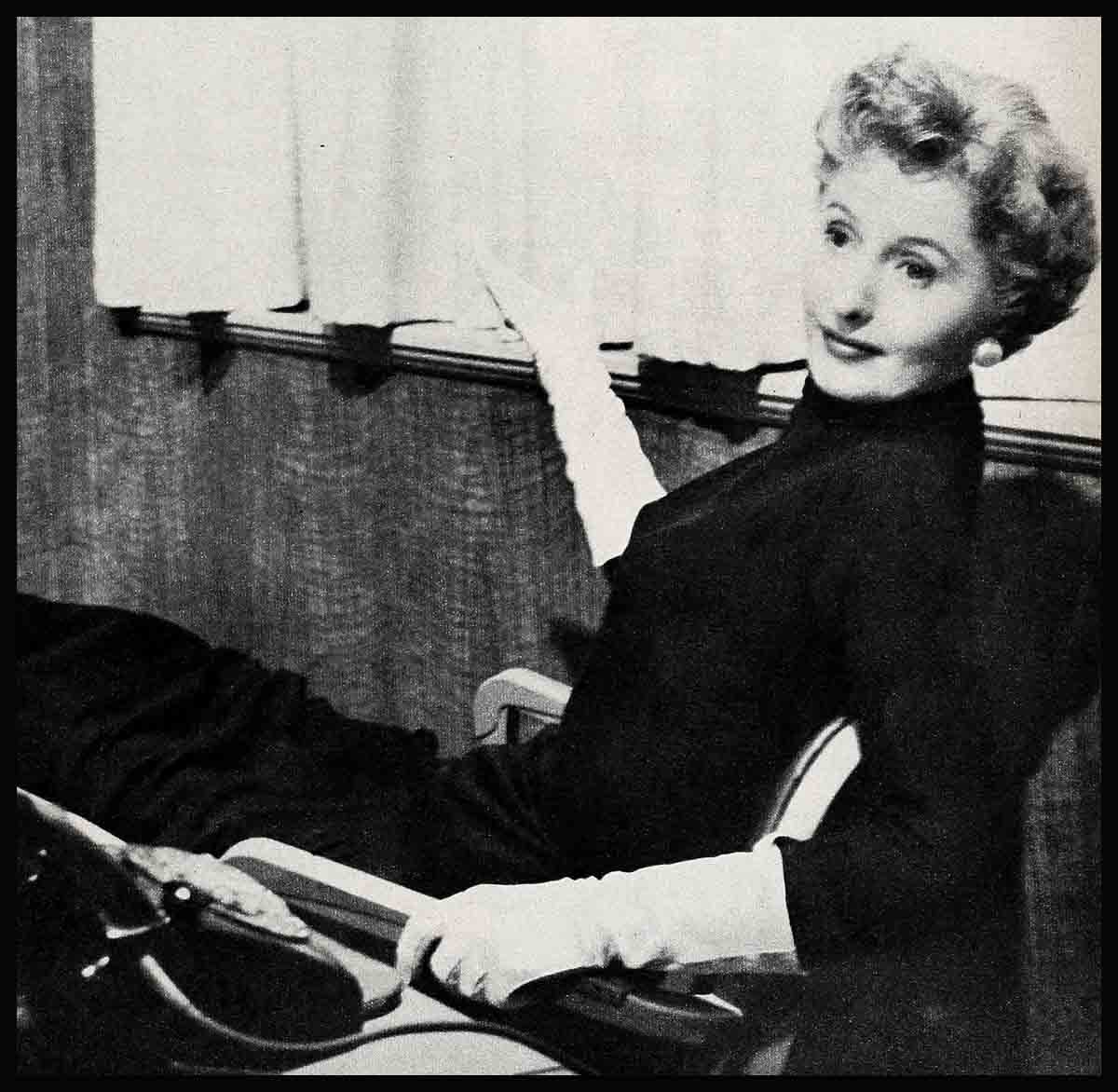
The Poison Gas Of Gossip—Barbara Stanwyck
Barbara Stanwyck has one deep hate in her heart, and only one—the hatred of gossip.
She believes it is gossip—not temperament, inflated ego, wealth or the ever-present “other man” and “other woman”—that is largely responsible for the breakage of careers, marriages, homes and hearts in Hollywood, and elsewhere. She loathes the poisonous stuff and those who handle or peddle it.
In every other respect, Barbara is easygoing, tolerant and relaxed. It’s said in Hollywood that, if the studios had more Stanwycks working for them, there would be fewer ulcers in the movie industry. Barbara doesn’t re-write scripts, walk off sets, believe she knows more than her producer and director, engage in feuds with her colleagues, make trouble—or the kind of headlines that give Hollywood a headache and a bad name. She does her job quietly, with a minimum of temperament, and so well that it’s been said, “Every Stanwyck performance rates an Oscar, which is why she’s never had one. When you’re always tops, you’re taken for granted.”
Barbara is as honest as home-made bread. She doesn’t camouflage the silver in her hair. She tells the truth to anyone interested enough (or curious enough) to ask her age. “Too many women wear themselves out,” she says, “trying to look like a young star, and for what? Every age has its appeal and its compensations.” Barbara says what she has to say to your face, not to someone else. She is never catty. Her creed is, “Live and let live,” or to put it bluntly (as she does), “Mind your own business.” And she practices what she preaches. “What other people do,” she says, “is none of my business. I have enough trouble living my own life.”
To such a temperament, the constant fumes of gossip would naturally seem like a curse. It frequently is, and not without reason.
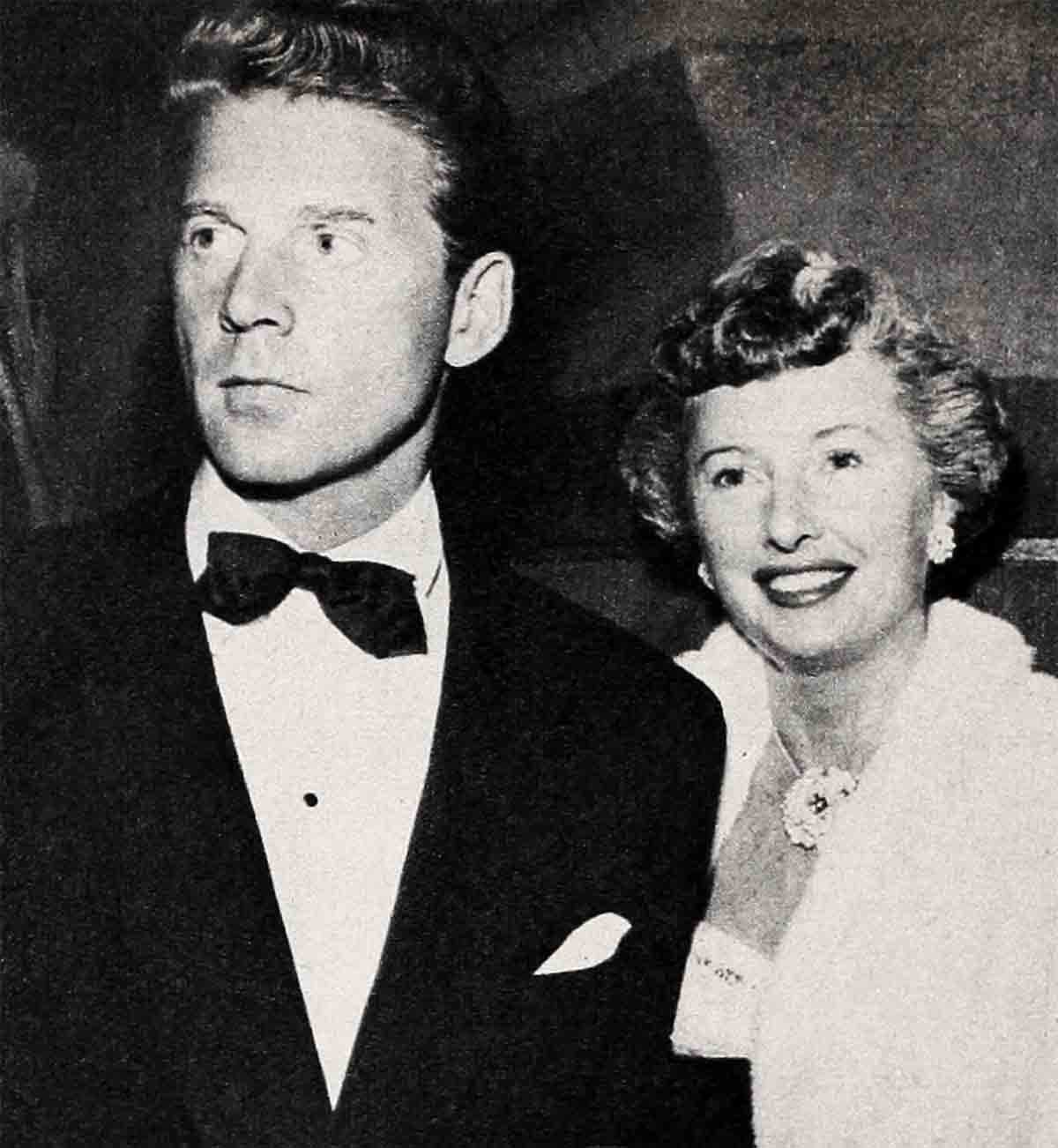
For example, one day, Barbara tried to open a casement window, the kind you have to push out. As she tells it: “The darn thing stuck. I gave it a hefty blow with the heel of my hand. It didn’t budge but my hand went right on through the glass and the blood spurted from a deep and dandy gash on my wrist. When the doctor arrived he quickly hauled me off to the hospital. So that my friends wouldn’t worry, I gave orders to everyone in the house to say nothing about the accident. That did it. A reporter saw ‘cut wrist’ on the hospital register and by midnight it was all over town that I’d tried to commit suicide!
“Then there was the night,” Barbara continues, “when Bob Taylor and I were having dinner at La Rue. We were discussing something we didn’t agree on, and after a while we were both arguing earnestly. Now, I love a good argument, so I was having a wonderful time. I pounded the table, waggled my forefinger a mile a minute, and couldn’t have been happier—or more deaf to Bob’s whispered warning to pipe down or “They’ would be saying. . . .
“Sure enough, at midnight, my agent Helen Ferguson’s phone rang. One of the ‘Little Pitchers That Have Big Ears’ was calling to tell her that Bob and I had had ‘a big rousing fight in public—and what did it mean?’ What the ‘Little Pitcher’ took it to mean certainly was back-fence gossip come the next morning!
And there are always the sly items,” Barbara adds, “either in print or by word of mouth, such as ‘What popular star, supposedly happily married, is secretly dating what noted director?” and so on.
“This sort of thing can sow seeds of suspicion, even in a good marriage. Actually, however, if gossip can break up a marriage, it is ready to break up. Although not, in some instances, perhaps, so soon. One of the most dangerous things about gossip,” Barbara says emphatically, “is that ‘They’ can’t wait! “They’ rush you. A boy and a girl start going together and ‘They’ want to know, When are they going to get married? ‘They’ can’t wait to get you married; ‘They’ can’t wait to get you divorced. This can be terribly embarrassing.
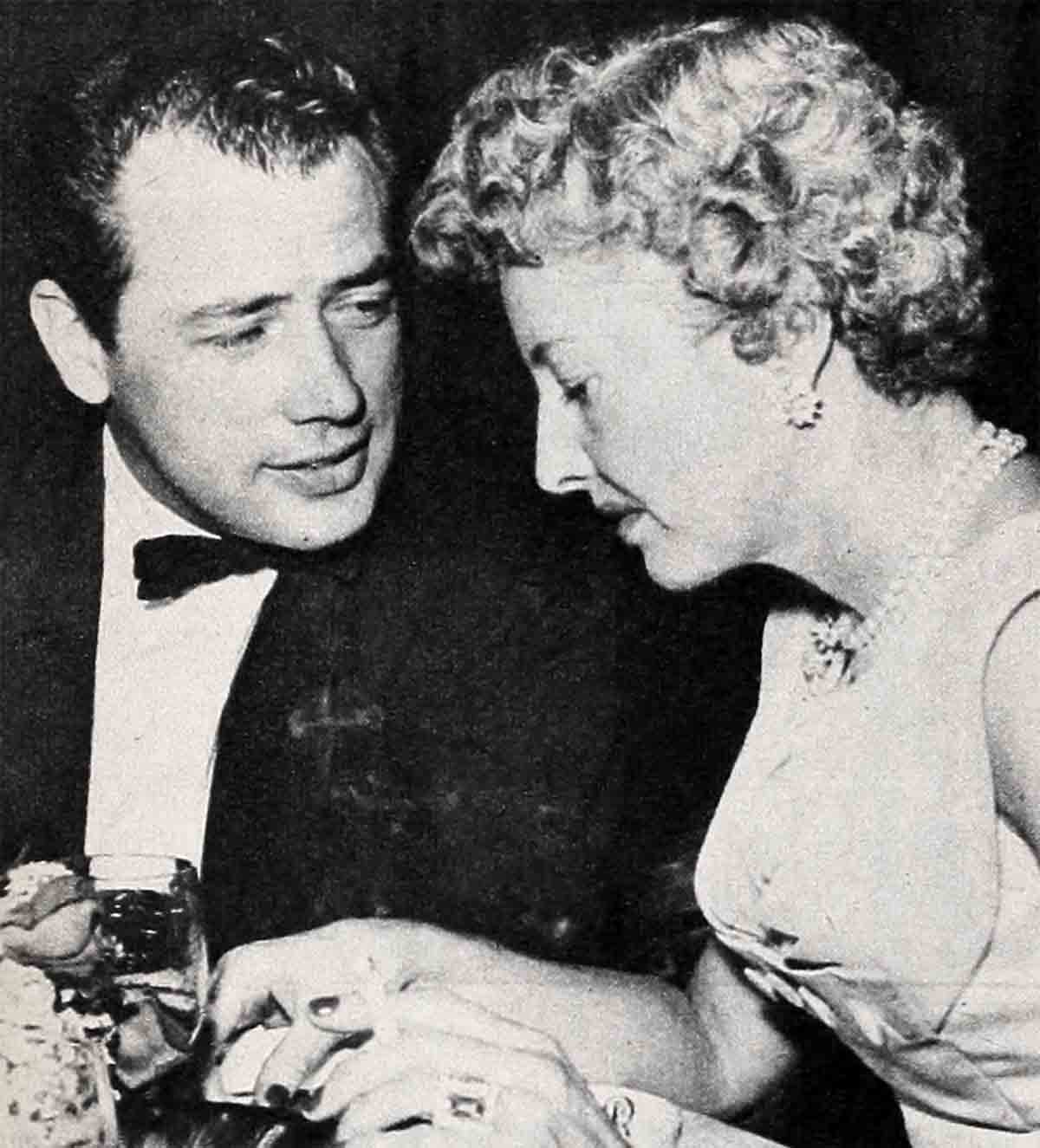
“And who are ‘They’ anyway? Where are “They’?” Barbara challenges. “You don’t know. You never know. They stay underground. You can’t find them, can’t grapple with them any more than you can with smog, or any poisons in the air.
“Gossip can play as much havoc in a small town as it does in Hollywood, or any other city. But if there is gossip about the banker’s wife or the minister’s son in a small town, you have a Chinaman’s chance of tracking it down and, if you’re mad enough, take care of the scandal-monger. But not in Hollywood. Personalities are Hollywood’s business and personalities are news. So, what can you do about it? Besides, denial adds fuel to the fire. Here, your best bet is to ignore the gibble-gabble and the gibble-gabblers.
“Creating feuds,” Barbara points out, “is another choice little pastime of the back-fence set. For example, when I was making ‘Strange Love of Martha Ivers’ at Paramount, I had just one scene to do, with Lizabeth Scott. The day it was scheduled I was ill, really ill, with a cold. I didn’t feel well enough to work, but if I didn’t, I suspected something would be made of it! So I went straight to Lizabeth’s dressing room and explained to her that I’d caught a cold and didn’t want her to get too close to me for fear she’d catch it. Strictly in the interest of avoiding contagion, we kept our distance from each other—and the gossips had their way with us anyhow!
“It is too ridiculous just to think that you can’t have an ordinary household accident or a good argument without the gossips making an ‘attempted suicide’ of the one and a Reno-bound battle out of the other. Or that a cold in the head, from which you try to protect a fellow-player, gives birth to a feud! But at least a cut wrist, a table-pounding argument and two actresses keeping at arm’s length does give ‘Them’ ammunition, something specific to yak about. It is when gossip starts and spreads for no reason that it’s the most deadly.
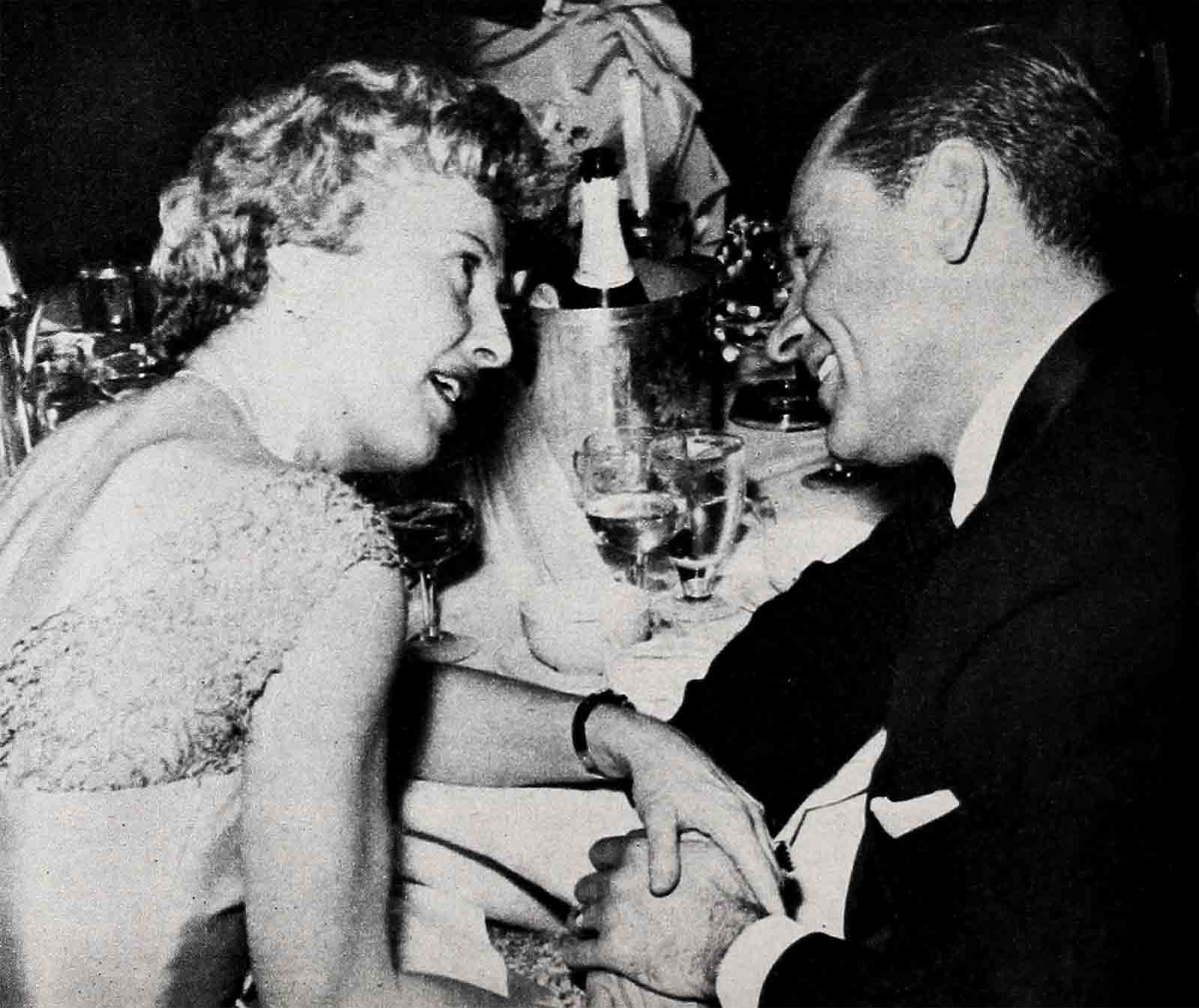
“There’s a tragic story about a young actress I knew who was beautiful and really talented. She was a gentle girl, very modest, always well-behaved. You would have sworn she was destined to be a star soon. But the girl’s career suddenly, and for no reason I have been able to learn, came to an end. I never heard anyone actually speak one bad word about her. Actually, what was done to her was more insidious than the spoken word: In small groups, most often hen groups, whenever this girl’s name was mentioned, eyebrows raised, shoulders shrugged, women exchanged ‘knowing glances’ and the silence that ensued was violent—and vile—in its innuendo. Usually, I’m not curious about my neighbor (or his wife), but I was curious enough to try to solve this mystery. I never did. To this day I haven’t the remotest idea why this girl was crucified. But that the cruelty behind it was successful in ending what could have been an important career, this is for sure!
“The fabrication of fantastic stories about married couples or engaged couples,” says Barbara, “is another juicy pastime of the gossips, the vicious ones, who are, in actual practice, character assassins. Those of us who have been in Hollywood and in the business long enough can spot these tall tales for the fiction they are. But newcomers to our town, and gullible people outside the industry, really latch on to these fantasies, embroider them, spread them, and, in time, believe them.
“Take that tired old yarn about the frantic embarrassment of a married couple when guests walked in on them, unexpectedly, in the privacy of their home. This ludicrous but lewd yarn has been whispered about practically every important couple in Hollywood for the last twenty years. Only recently it went the rounds again as a factual story, without naming names, in a book purportedly dealing with ‘The Truth about Hollywood.’ Weird stories, which leave the people involved nameless, are one poisonous form of gossip. The nameless ones are so adroitly ‘described’ they could be any number of people, and so these wildcat rumors often inflict a blot on the record of entirely innocent people. And somehow these blots seem to be indelible!
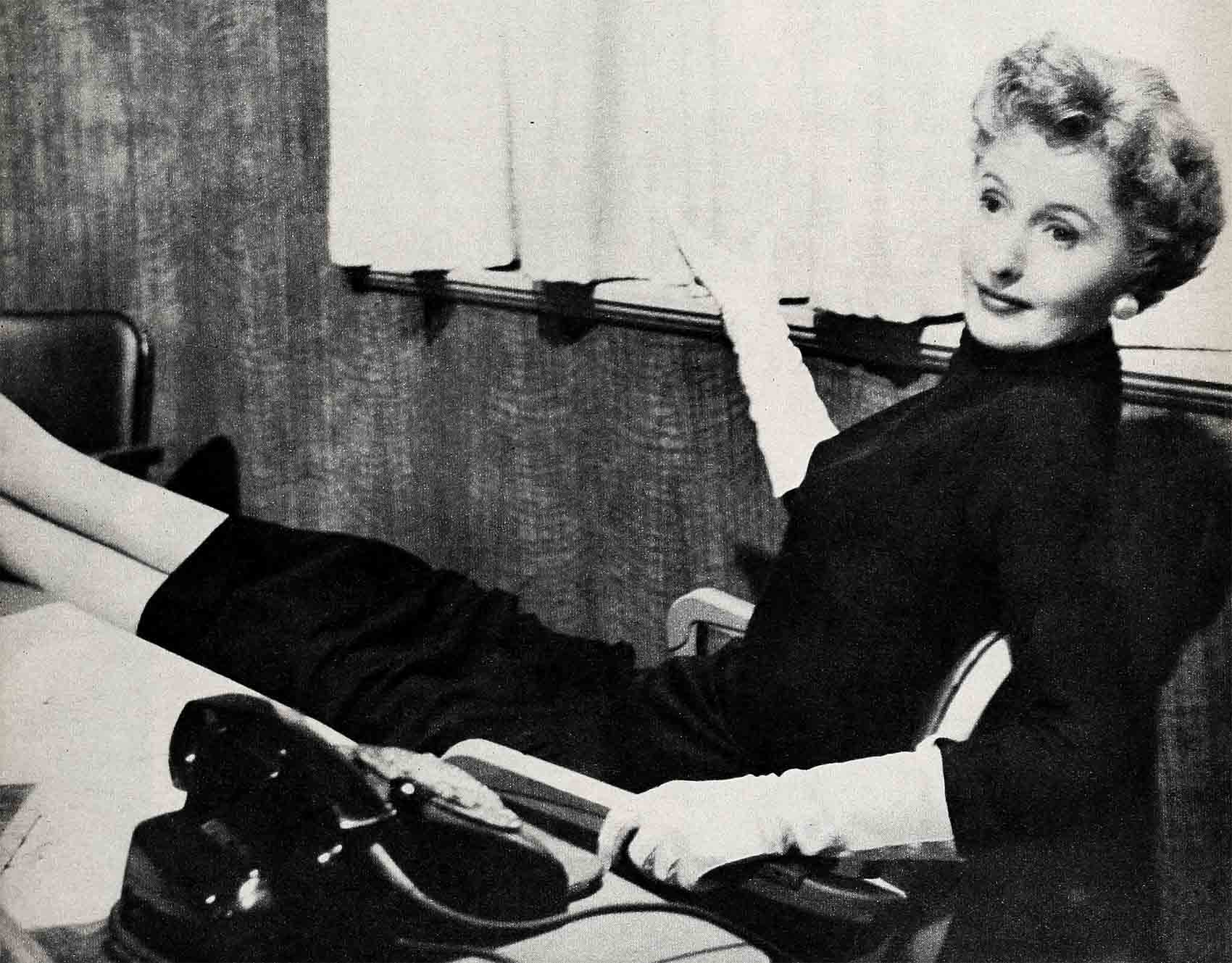
“At its least deadly,” says Barbara, “gossip can whittle down your phone calls and scare away your dates. A nice guy takes you out to dinner; the next day he learns the gossips have it that he is going to marry you!
“I speak,” Barbara laughs, “with the Voice of Experience! Some time ago, I went out several times with Jean Pierre Aumont, widower of the beautiful Maria Montez, and who is now married to Marisa Pavan. Before we’d had two dates, ‘They’ had us married nine times! We were going to be married in Las Vegas. We were going to be married in Paris. We were going to live in Europe. Now Jean Pierre’s a wonderful, sensitive, nice guy, but we didn’t have any romance. I wasn’t in the mood for romance and Jean Pierre certainly wasn’t over his grief for Maria. ‘Let’s not get embarrassed with each other,’ I told him.
“But how could we help it?” Barbara asks indignantly. “Especially since every time our ‘wedding plans’ were mentioned, Maria was mentioned, too. Believe me, this man loved that woman and reminders of her death upset him dreadfully.
“I also went out a couple of times with producer Paul Gregory, a very fine and an exceptionally interesting young man. We had fun together, enjoyed each other’s company, but it was not love, it was not romance. One night during dinner at La Rue, Paul, to emphasize a point he was making, took hold of and held my hand. The next day: ‘New Romance, Wedding Bells Expected!’
“One night,” Barbara continues, “I accepted a dinner invitation from long-time bachelor, long-time friend and my co-star in ‘Titanic,’ Clifton Webb. As we were finishing dinner, Bob Wagner, who was also in “Titanic, joined us. The next day I read and heard I was ‘dating Wagner’! I did not go out, that night or any other, with Bob. Not that it matters. The photographer took several shots of the three of us at the table. And what did they do but cut Clifton out of the picture when it was printed!
“They’ve had Clifton and me getting married, too! Also Bob Stack and I, even George Nader. All rumor—big stuff!” Barbara says sarcastically.
“Just as the career of the girl I mentioned was ended, by a general freeze-out, for no known reason at all, so ‘romance rumors’ come right out of nothing.
“Here is one of the funnier fables about me,” Barbara grins. “Nancy Sinatra called me one day to tell me she’d heard that Prince Something-Something of Saudi-Arabia had given me a diamond necklace ‘as big’ it says here, ‘as Fort Knox,’ said Nancy. I’d never heard of Prince Something-Something. I had barely heard of Saudi-Arabia! ‘I resent that item’ I said to Nancy, ‘because, where’s my diamond necklace?’
“I was kidding,” Barbara adds, “when I said, ‘I resent that item.’ However, I do resent some items. It’s a shame that you can’t have any difference of opinion with a friend, or a husband, without the gossips predicting the end. It’s healthy to argue; a polite relationship is a dead relationship. It’s a shame you can’t have dates without embarrassing the life out of them. Or a household accident, or a cold in the head without discovering, all of a sudden, that blood is running out of your back! ‘For heaven’s sake,’ I feel like saying, ‘we’re human, aren’t we?’ Or are we? I sometimes wonder. I also feel like saying, ‘Making pictures is a great big wonderful business. Why try to destroy it by nasty little cracks?’ Gossip is a termite in my book.
“Then,” Barbara sighs, “I tell myself that gossip is as old as man, and the first false rumor came from a snake in the Garden of Eden. It’s a little late for it to be uprooted, so why try? So I don’t try, other than by minding my own business. And even if I get big-eared about some intriguing information, I manage to keep my mouth shut. And, since I’m a TV fan and that makes me a stayer-at-home, there haven’t been many rumors to deny, or ignore, lately.
“Actually, I feel sorry for those whose lives are so starved they must rely on gossip to feed their existence. So I guess I’m not too mad at them, after all. Just sorry.
“A friend of mine,” Barbara concludes, “has two sayings that I should remember! One is: ‘They say! What say they! Let them say!’ The other is: ‘Never complain. Never explain.’”
THE END
—BY GLADYS HALL
It is a quote. PHOTOPLAY MAGAZINE JUNE 1956




